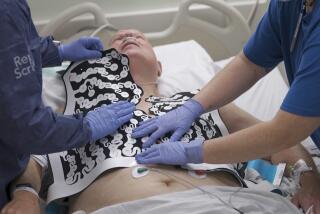Jeffrey Isner, 53; Pioneered Gene Therapy for Bad Hearts
- Share via
Dr. Jeffrey M. Isner, a Boston cardiologist who pioneered the use of gene therapy to treat people with heart disease, died unexpectedly early Wednesday morning of a heart attack. He was 53.
Working with patients who were too sick and whose arteries were too clogged for bypass surgery or angioplasty, Isner’s team at St. Elizabeth’s Medical Center in Boston and Tufts University School of Medicine devised a technique to stimulate the growth of new blood vessels to the heart, bypassing the clogged vessels, easing pain and restoring some patients to full lives.
The team injected the gene for a protein called vascular endothelial growth factor into the heart. The goal was that it would be taken up by heart cells, leading to the production of the growth factor, which stimulates the growth of new blood vessels.
The treatment appeared to work. In a published report last fall, Isner’s team said that nine of the first 13 heart patients they treated showed evidence of increased heart function after the procedure.
One patient, Floyd Stokes, bought a peanut farm after the treatment to replace the farm he had sold when he was refused another bypass operation and thought he was going to die.
In earlier studies, Isner’s team used the same procedure to restore circulation in legs damaged by artery blockages.
“Dr. Isner led the way in our understanding of new revascularization strategies, especially in the area of genetic tools,” said Dr. Sidney Smith, chief science officer of the American Heart Assn. “This is a great personal and professional loss.”
Isner’s program fell under scrutiny from the Food and Drug Administration following the 1999 death of a University of Pennsylvania patient in a gene therapy trial.
In the ensuing FDA investigation of all gene therapy centers, his clinical trials were shut down in February 2000. FDA officials said that he had failed to report the death of one patient to the hospital’s safety review board and had endangered the lives of other patients by improperly enrolling them in the trials.
Two other severely ill patients he treated died of cardiac arrest within a day after their procedures. Isner said they died of their underlying illnesses, and the FDA has not disputed that claim.
Isner was allowed to resume his clinical trials earlier this year. The team is now treating patients and planning new trials. St. Elizabeth’s has invested more than $10 million in Isner’s research and joined with him to form a company to exploit the findings. He also recently received a $10-million grant from the National Institutes of Health to further the research.
The death represents a blow to St. Elizabeth’s, which built a first-class cardiology department around him. “I know they will continue his legacy,” said Dr. John Harrington, dean at Tufts.
Isner is survived by his wife and three children, all under age 15.






